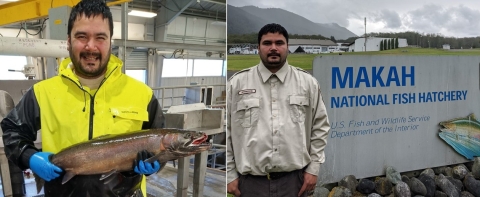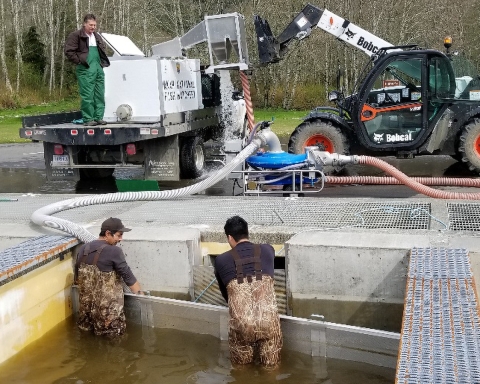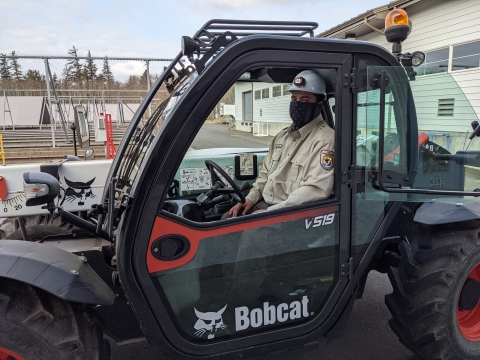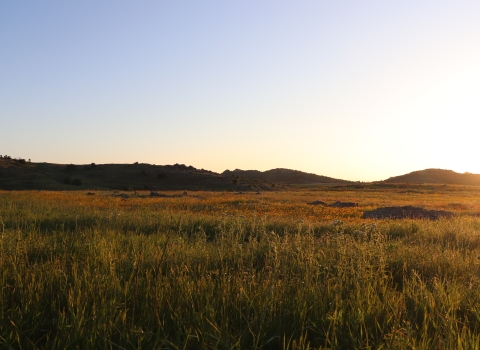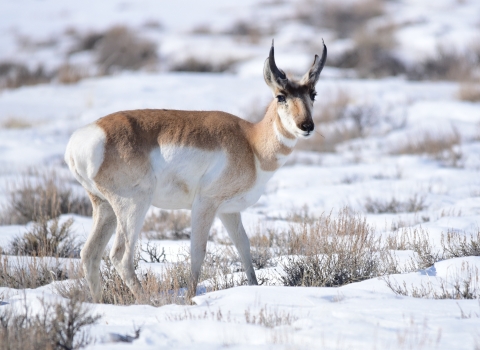Thomas “Homie” Johnson faced an uncertain future in 2015.
The Makah Tribal member knew he wanted to stay on the reservation in Neah Bay, the town where he grew up, married his high school sweetheart and is raising his three boys. But career job opportunities can be tough to come by on the extreme northwest tip of the Olympic Peninsula in Washington.
When a job at Makah National Fish Hatchery (NFH) as a Makah Tribal Employment Rights Office (TERO) employee opened up in 2015, it was the opportunity Johnson needed.
His first job was collecting creel surveys on the Tsoo-Yess River from the hatchery to where it drains into the Pacific Ocean. His outgoing personality made him a great choice for kayaking down the river to interview fisherman, and being an enrolled Makah Tribal member made him a strong asset when gathering harvest data.
Johnson was soon hooked on working at Makah NFH and learning everything he could about raising Pacific salmon. His passion and love for fisheries grew deeper and he never looked back. Johnson has been working as a permanent, full-time U.S. Fish and Wildlife Service employee since 2020, allowing him to achieve his goal of staying close to home while also providing long-term security for his family.
Read more: Weathering the Pandemic: Makah Hatchery Staff Comes Together During Extreme Isolation
“This job was pretty important since I didn’t take the traditional path of schooling, such as college or a trade school,” Johnson said. “I worked really hard as both a TERO and now as a Service employee. It seemed like the right choice for professional growth.”
That jump to federal employment was made possible by the TERO program, which provided the perfect steppingstone for Johnson. Makah NFH established its first TERO financial agreement with the Makah Tribe more than 20 years ago, enabling the hatchery to recruit and hire local qualified applicants. These TERO employees were then able to support hatchery fish production operations, while gaining all the necessary skills to compete for permanent federal positions at the hatchery.
Before his fisheries conservation career, Johnson dabbled in commercial fishing out of Neah Bay, which resides within the Makah Reservation. Like many Makah youth, he grew up with fishing at heart because fishing has been a way of life since time immemorial for the Tribe.
As a TERO employee at Makah NFH, Johnson had the rare opportunity to learn from four other Makah Tribal members who made careers with the Service, totaling 120 years under their collective belts. This included Jim LaChester, who was a TERO employee prior to being hired by the Service and amassed over 22 years between the two positions.
Related article: Jane Lemieux Returns Home, Just Like the Salmon She Raises at Quinault NFH
“The TERO program opened the door for sure, but sticking with it, working hard, and learning from the other employees really made my application stick out,” Johnson said. “Thankfully, I had a lot of support and was able to highlight all of my experience working at the hatchery. I started the application process in October of 2019. I was sweating the whole time but was thankful and relieved when I was offered the job in February of 2020.”
Having Johnson and his Tribal experience on staff also brings a wealth of traditional knowledge and skills to the hatchery. His knowledge of the community and river systems, and dedication to bringing back strong runs of fish for everyone are some of the priceless attributes that Makah NFH has gained.
Yet he still sees room for growth. When asked about his favorite part of his job, Johnson replied: “The opportunity to continuously learn. I may be a fish culturist, but I get to do maintenance, construction, yard work, heavy equipment, and a lot more. That makes the job enjoyable and there’s never a dull moment.”
Johnson has also smoothly transitioned from mentee to mentor. This includes passing on what he’s learned to his brother Thayne, who applied for the vacated TERO position and has been an asset to Makah NFH for more than two years.
“The TERO agreements with the Makah Tribe are exceptionally valuable to the hatchery,” said Kristin Bates, Makah NFH manager. “It allows us to pull in qualified staff from the local area and give them the training and experience needed to be competitive for permanent positions at the hatchery. In return, we get good employees who have a significant cultural tie to the fish we produce.”
Makah NFH strives to grow a strong and successful staff and keep their Tribal Trust responsibilities to the Makah Tribe at the front of everything. Johnson’s story is just one of many successes, but every day the staff is reminded of how hard work, dedication, and commitment to family and a career can grow from deep within an individual.
Johnson’s next career goal is to advance to an Assistant Manager role at Makah National Fish Hatchery, which would be a first for a Makah Tribal member. Johnson is on a path toward achieving that goal and so much more.


